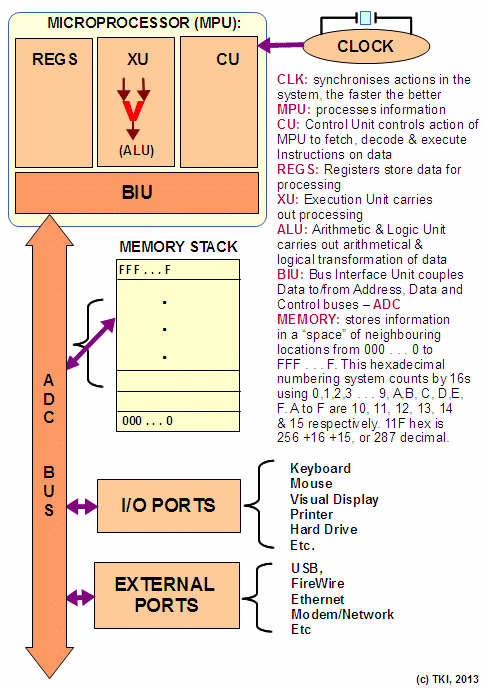Those who have been following recent exchanges at UD will recognise that the headlined summarises the current objection highlighted by objector RDFish, an AI advocate and researcher.
A bit of backdrop will be useful; a clip from in the blog/site “Common Sense Atheism” will aid us in understanding claim and context:
Contra-causal free will is the power to do something without yourself being fully caused to do it. This is what most people mean by “free will.” Contra-causal free will is distinct from what you might call caused free will, which is the type of free will compatibilists like Frankfurt and Dennett accept. Those with caused free will are able to do what they want. But this doesn’t mean that their actions are somehow free from causal determination. What you want, and therefore how you act, are totally determined by the causal chain of past events (neurons firing, atoms moving, etc.) Basically, if humans have only caused free will, then we are yet another species of animal. If humans have contra-causal free will, then we have a very special ability to transcend the causal chain to which the rest of nature is subject.
This obviously reflects the underlying view expressed by William Provine in his well known 1998 U Tenn Darwin Day keynote address:
However, it is hard to see how such views — while seemingly plausible in a day dominated by a priori evolutionary Materialism and Scientism — can escape the stricture made by J B S Haldane at the turn of the 1930s:
“It seems to me immensely unlikely that mind is a mere by-product of matter. For if my mental processes are determined wholly by the motions of atoms in my brain I have no reason to suppose that my beliefs are true. They may be sound chemically, but that does not make them sound logically. And hence I have no reason for supposing my brain to be composed of atoms. In order to escape from this necessity of sawing away the branch on which I am sitting, so to speak, I am compelled to believe that mind is not wholly conditioned by matter.” [“When I am dead,” in Possible Worlds: And Other Essays [1927], Chatto and Windus: London, 1932, reprint, p.209.]
It is not helpful to saw off the branch on which we all must sit: in order to do science, as well as to think, reason and know we must be sufficiently free and responsible to be self-moved by insight into meanings and associated ground-consequent relationships not blindly programmed and controlled by mechanical necessity and/or chance, directly or indirectly. (It does not help, too, that the only empirically known, adequate cause of functionally specific, complex organisation and associated information — FSCO/I — is design.)
That is, we must never forget the GIGO-driven limitations of blindly mechanical cause-effect chains in computers:
. . . and in neural networks alike:
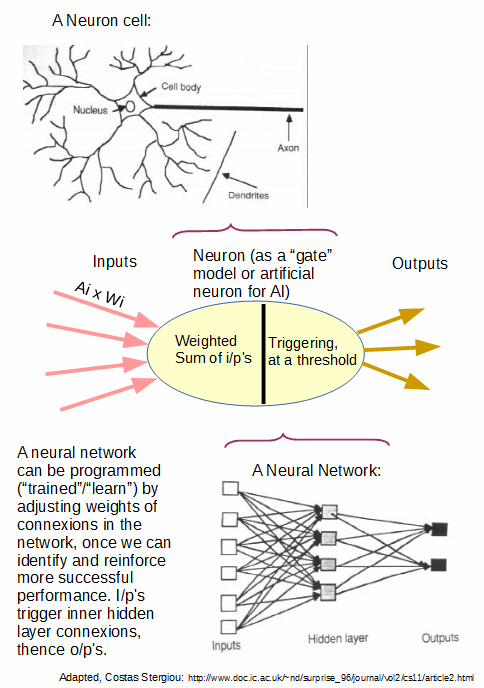
That is, it is quite evident that for cause, we can reasonably conclude that mechanical cause-effect chain based computation is categorically distinct from self-aware, self-moved responsible, rational contemplation.
[U/D Aug. 21:] Where, it will help to note on the classic structured programming structures, which — even if they incorporate a stochastic, chance based process — are not examples of freely made insight based decisions (save those of the programmer) but instead are cases of blind GIGO-limited computation based on programmed cause-effect sequences:
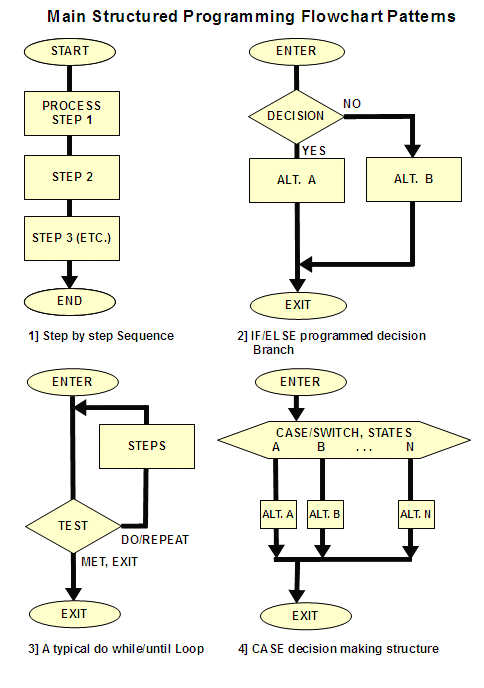
In turn, that points to intelligence, an observed and measurable phenomenon.
This, too, is being stridently dismissed as a dubious metaphysically driven assumption; so let us note from an Educational Psychology 101 site:
E. G. Boring, a well-known Harvard psychologist in the 1920′s defined intelligence as whatever intelligence tests measure. Wechsler, one of the most influential researchers in the area of intelligence defined it as the global capacity of a person to act purposefully, to think rationally, and to deal effectively with his/her environment. Notice that there is a conative aspect to this definition. [–> AmHD: co·na·tion (k-nshn) n. Psychology The aspect of mental processes or behavior directed toward action or change and including impulse, desire, volition, and striving.] Many modern psychology textbooks would accept a working definition of intelligence as the general ability to perform cognitive tasks. Others might favor a more behaviorally-oriented definition such as the capacity to learn from experience or the capacity to adapt to one’s environment. Sternberg has combined these two viewpoints into the following: Intelligence is the cognitive ability of an individual to learn from experience, to reason well, to remember important information, and to cope with the demands of daily living.
That is, we have an empirically founded, measurable concept. One that sees major application in science and daily life.
Where, further, design can then be understood as intelligently, purposefully directed contingency — that is, design (and its characteristic outputs such as FSCO/I) will be manifestations of intelligent action. So, it is unsurprising to see leading ID researcher William Dembski remarking:
We know from experience that intelligent agents build intricate machines that need all their parts to function [–> i.e. he is specifically discussing “irreducibly complex” objects, structures or processes for which there is a core group of parts all of which must be present and properly arranged for the entity to function (cf. here, here and here)], things like mousetraps and motors. And we know how they do it — by looking to a future goal and then purposefully assembling a set of parts until they’re a working whole. Intelligent agents, in fact, are the one and only type of thing we have ever seen doing this sort of thing from scratch. In other words, our common experience provides positive evidence of only one kind of cause able to assemble such machines. It’s not electricity. It’s not magnetism. It’s not natural selection working on random variation. It’s not any purely mindless process. It’s intelligence . . . .
When we attribute intelligent design to complex biological machines that need all of their parts to work, we’re doing what historical scientists do generally. Think of it as a three-step process: (1) locate a type of cause active in the present that routinely produces the thing in question; (2) make a thorough search to determine if it is the only known cause of this type of thing; and (3) if it is, offer it as the best explanation for the thing in question.
[William Dembski and Jonathan Witt, Intelligent Design Uncensored: An Easy-to-Understand Guide to the Controversy, pp. 20-21, 53 (InterVarsity Press, 2010). HT, CL of ENV & DI.]
But, one may ask, why is it that FSCO/I and the like are observed as characteristic products of intelligence? Is that a mere matter of coincidence?
No.
Because of the blind, needle- in- haystack challenge (similar to that which grounds the second law of thermodynamics in its statistical form) faced by a solar system of 10^57 atoms or an observed cosmos of some 10^80 atoms, a 10^17 s blind chance and mechanical necessity driven search process faces empirically insuperable odds:
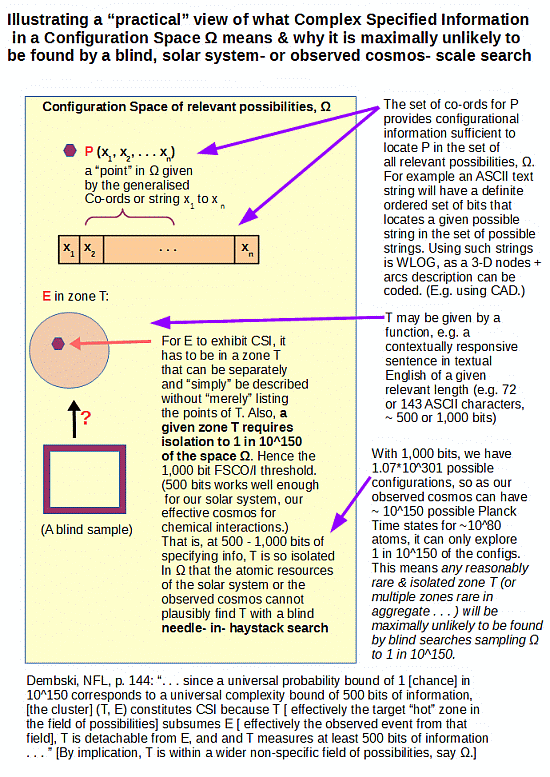 So, even the notion that our brains have been composed and programmed by a blind chance and necessity search process over 4 bn years of life on earth is dubious, once we see that FSCO/I beyond 500 – 1,000 bits faces a super-search challenge.
So, even the notion that our brains have been composed and programmed by a blind chance and necessity search process over 4 bn years of life on earth is dubious, once we see that FSCO/I beyond 500 – 1,000 bits faces a super-search challenge.
As for the notion that blind chance and mechanical necessity adequately account for the origin and diversification across major body plans, of cell based life, let the advocates of such adequately account — on observed evidence not a priori materialist impositions dressed up in lab coats — for something like protein synthesis (HT, VJT, onward thanks Wiki Media):
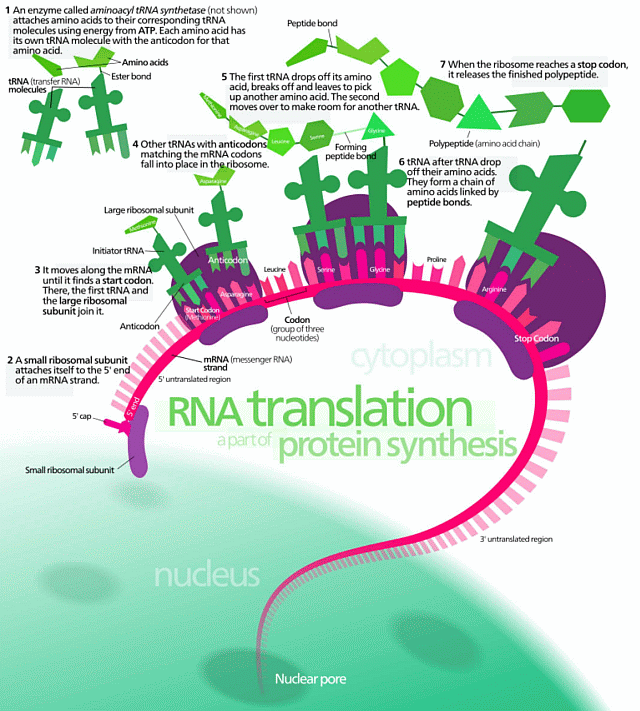
That is the context in which, on Sunday, I responded to RDF at 235 in the Do We Need a Context thread, as follows — only to be studiously ignored (as is his common tactic):
______________
>>I find it important to speak for record:
[RDF to SB:] . . . ID rests on the assumption of libertarianism, an unprovable metaphysical assumption
This characterisation of SB’s reasoning is false to the full set of options he puts on the table, but I leave answering that to SB.
What is more interesting is how you[–> RDF] switch from an empirical inference to projection of a phil assumption you reject while ignoring something that is easily empirically and analytically verifiable. Which, strongly implicates that the root problem we face is ideological, driven and/or influenced by a priori evolutionary materialism [perhaps by the back door of methodological impositions] and/or its fellow travellers.
First, intelligence is a summary term for the underlying capacity of certain observed beings to emit characteristic behaviours, most notably to generate FSCO/I in its various forms.
For example as your posts in this thread demonstrate, you understand and express yourself in textual language in accord with well known specifications of written English. It can be shown that it is extremely implausible for blind chance and/or mechanical necessity to stumble upon zones of FSCO/I in the sea of possible configurations, once we pass 500 – 1,000 bits of complexity. Where as 3-d descriptions of complex functional objects can easily be reduced to strings [cf. AutoCAD etc], discussion on strings is WLOG.
At no point in years of discussion have you ever satisfactorily addressed this easily shown point. (Cf. here.)
Despite your skepticism, the above is sufficient to responsibly accept the significance of intelligence per a basic description and/or examples such as humans and dam-building beavers or even flint-knapping fire-using omelette-cooking chimps — there is reportedly at least one such. Then there was a certain bear who was a private in the Polish Army during WW II. Etc.
Being human is obviously neither necessary to nor sufficient for being intelligent.
Nor for that matter — given the significance of fine tuning of our observed cosmos from its origin, would it be wise to demand embodiment in a material form. Where also, it has been sufficiently pointed out — whether or no you are inclined to accept such — that a computational material substrate is not enough to account for insightful, self-aware rational contemplation.
We should not ideologically lock out possibilities.
Where also, the notion of “proof” — as opposed to warrant per inference to best explanation — is also material. In both science and serious worldviews discussion, IBE is more reasonable as a criterion of reasonableness than demonstrative proof on premises acceptable to all rational individuals etc. The projection of such a demand while one implicitly clings to a set of a prioris that are at least as subject to comparative difficulties challenge is selective hyperskepticism.
So, already we see a functional framework for identifying the attribute intelligence and using it as an empirically founded concept. One that is in fact a generally acknowledged commonplace. Let me again cite Wiki, via the UD WACs and Glossary as at 206 above . . . which of course you ignored:
Intelligence – Wikipedia aptly and succinctly defines: “capacities to reason, to plan, to solve problems, to think abstractly, to comprehend ideas, to use language, and to learn.” . . . .
Chance – undirected contingency. That is, events that come from a cluster of possible outcomes, but for which there is no decisive evidence that they are directed; especially where sampled or observed outcomes follow mathematical distributions tied to statistical models of randomness. (E.g. which side of a fair die is uppermost on tossing and tumbling then settling.)
Contingency – here, possible outcomes that (by contrast with those of necessity) may vary significantly from case to case under reasonably similar initial conditions. (E.g. which side of a die is uppermost, whether it has been loaded or not, upon tossing, tumbling and settling.). Contingent [as opposed to necessary] beings begin to exist (and so are caused), need not exist in all possible worlds, and may/do go out of existence.
Necessity — here, events that are triggered and controlled by mechanical forces that (together with initial conditions) reliably lead to given – sometimes simple (an unsupported heavy object falls) but also perhaps complicated — outcomes. (Newtonian dynamics is the classical model of such necessity.) In some cases, sensitive dependence on [or, “to”] initial conditions may leads to unpredictability of outcomes, due to cumulative amplification of the effects of noise or small, random/ accidental differences between initial and intervening conditions, or simply inevitable rounding errors in calculation. This is called “chaos.”
Design — purposefully directed contingency. That is, the intelligent, creative manipulation of possible outcomes (and usually of objects, forces, materials, processes and trends) towards goals. (E.g. 1: writing a meaningful sentence or a functional computer program. E.g. 2: loading of a die to produce biased, often advantageous, outcomes. E.g. 3: the creation of a complex object such as a statue, or a stone arrow-head, or a computer, or a pocket knife.) . . . .
Intelligent design [ID] – Dr William A Dembski, a leading design theorist, has defined ID as “the science that studies signs of intelligence.” That is, as we ourselves instantiate [thus exemplify as opposed to “exhaust”], intelligent designers act into the world, and create artifacts. When such agents act, there are certain characteristics that commonly appear, and that – per massive experience — reliably mark such artifacts. It it therefore a reasonable and useful scientific project to study such signs and identify how we may credibly reliably infer from empirical sign to the signified causal factor: purposefully directed contingency or intelligent design . . .
Indeed, on just this it is you who have a burden of warranting dismissal of the concept.
Where also, design can be summed up as intelligently directed contingency that evidently targets a goal, which may be functional, communicative etc. We easily see this from text strings in this thread and the PCs etc we are using to interact.
Again, empirically well founded.
So, the concept of intelligent design is a reasonable one, and FSCO/I as reliable sign thereof is also reasonable.
In that context the sort of rhetorical resorts now being championed by objectors actually indicate the strength of the design inference argument. Had it been empirically poorly founded, it would long since have been decisively undermined on those grounds. The resort instead to debating meanings of widely understood terms and the like is inadvertently revealing.
But also, this is clearly also a worldviews level issue.
So, I again highlight from Reppert (cf. here on) on why it is highly reasonable to point to a sharp distinction between ground-consequent rational inference and blindly mechanical cause effect chains involved in the operation of a computational substrate such as a brain and CNS are:
. . . let us suppose that brain state A, which is token identical to the thought that all men are mortal, and brain state B, which is token identical to the thought that Socrates is a man, together cause the belief that Socrates is mortal. It isn’t enough for rational inference that these events be those beliefs, it is also necessary that the causal transaction be in virtue of the content of those thoughts . . . [[But] if naturalism is true, then the propositional content is irrelevant to the causal transaction that produces the conclusion, and [[so] we do not have a case of rational inference. In rational inference, as Lewis puts it, one thought causes another thought not by being, but by being seen to be, the ground for it. But causal transactions in the brain occur in virtue of the brain’s being in a particular type of state that is relevant to physical causal transactions.
Unless we are sufficiently intelligent to understand and infer based on meanings, and unless we are also free enough to follow rational implications or inferences rather than simply carry out GIGO-limited computational cause-effect chains, rationality itself collapses. So, any system of thought that undermines rationality through computational reductionism, or through dismissing responsible rational freedom is delusional and self referentially incoherent.
You may wish to dismissively label responsible freedom as “contra-causal free will,” or the like and dismiss such as “unprovable.” That is of no effective consequence to the fact of responsible rational freedom that is not plausibly explained on blindly mechanical and/or stochastic computation. Which last is a condition of even participating in a real discussion — I dare to say, a meeting of minds.
That is, we again see the fallacy of trying to get North by heading due West.
It is time to reform and renew our thinking again in our civilisation, given the patent self-refutation of the ever so dominant evolutionary materialism. As Haldane pointed out so long ago now:
“It seems to me immensely unlikely that mind is a mere by-product of matter. For if my mental processes are determined wholly by the motions of atoms in my brain I have no reason to suppose that my beliefs are true. They may be sound chemically, but that does not make them sound logically. And hence I have no reason for supposing my brain to be composed of atoms. In order to escape from this necessity of sawing away the branch on which I am sitting, so to speak, I am compelled to believe that mind is not wholly conditioned by matter.” [[“When I am dead,” in Possible Worlds: And Other Essays [1927], Chatto and Windus: London, 1932, reprint, p.209.]
It is time for fresh, sound thinking. >>
______________
I actually think this is a good sign. In the 1980’s and 90’s as Marxism gradually crumbled, many Marxists redoubled their efforts, until the ship went down under them. So, the trend that objections to the design inference are now being commonly rooted in hyperskeptically challenging common sense, empirically warranted concepts such as design, intelligence and functionally specific quantifiably complex organisation and associated information all point to the gradual crumbling of the objector case on the actual empirical and analytical merits. END
